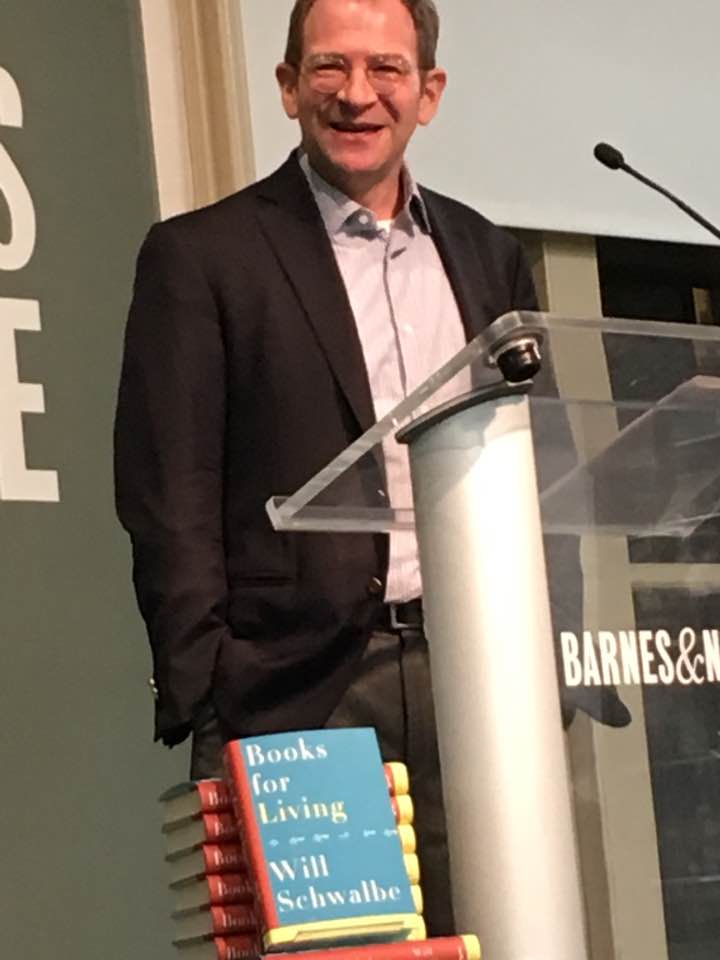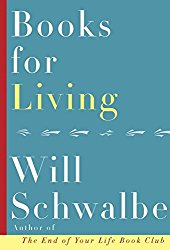For Will Schwalbe, I’d do just about anything, including driving into the Lower East Side of Manhattan on a rainy winter night from New Jersey—a pot-hole ridden, eighteen-wheeler infested car ride, to hear him launch his new memoir Books for Living at the Barnes and Noble in Union Square. And it turned out to be worth driving through every inch of the decrepit and claustrophobic Holland Tunnel.
I first met Schwalbe shortly before for his appearance at the second annual Nantucket Book Festival where he presented his memoir, The End of Your Life Book Club. I had interviewed him for N Magazine, and as a fledgling writer, it was a big moment for me. I could hardly believe I was sitting across from this famous author, editor and publishing czar, asking him what I later thought to be too many dumb questions. But he was a perfect gentleman—gracious, warm, engaging, and generous. I never forgot his kindnesses and have become one of his biggest fans, both in person and on the page.
With his trademark grin and handsomely boyish, bespeckled face, I found Schwalbe a second time, now four years later, standing next to a podium on the third floor of the biggest Barnes and Noble I have ever seen in my life with a copy of Books for Living in his hand, the same book he will be presenting to at the 2017 Nantucket Book Festival this coming June.


A fully packed house was impatiently waiting for him to speak and thunderous applause rose through the roof as his ample fan base welcomed his opening remarks.
“It is heartwarming,” he said, “with all that is going on in the world today, that so many people are sitting in a bookstore, about to listen to a reading about books. Books for living.”
“This book isn’t just a critique, or an index of the books I have read and loved, although there is an index in the back,” he continued, flipping the pages and smiling. “It is more a story of how these books and the authors that wrote them changed me in some intrinsic way and taught me valuable lessons I have carried and used throughout my life. Books that offer me coping mechanisms, even now. Perhaps today more so than ever.”
Indeed, what struck me while reading Books for Living was the way in which it provided the reader with intimate glimpses into the author’s life. Through his perception and understanding and his takeaway of each book, the reader comes to understand many of Schwalbe’s own fears and regrets, vulnerabilities and shortcomings, and even some his greatest loves and losses.
Books for Living includes stories across all genres—each one teaching a different life lesson—that, at first, the reader might never suspect. Stuart Little, for instance, taught him about unconditional love—the main character, a mouse, accepted as an equal member of a human family, was no less loved—a comforting thought to a child reader, trying to reckon his own identity at a young age.
The Odyssey, a great classic, taught Schwalbe how recognizing mediocrity teaches one to embrace humility. “After all,” he says, “Odysseus makes it to the end of his journey, but the journey was just mediocre at best—full of pitfalls and failures along the way—and that’s okay.”
In George Orwell’s 1984, Schwalbe says, “It set the precedence in so many ways, about being too digitally connected”— the theme of the intrusiveness of social media returning again and again his memoir— “or maybe we simply aren’t connected enough.”
In the question and answer at the end of Schwalbe’s talk, I asked him what he thought about the importance of book festivals in light of the current debate about freedom of speech and the distracting digital age in the 21st century. He answered thoughtfully, addressing the human connection of book festivals and the importance of coming together:
“They connect us to people who are our tribe, and things [books] that will survive us in an ever-increasing era of a digital mania. They are comforting places where people can sit and listen and learn. Books bring lessons, love, and ways to cope. They bring things to strive toward, things to dream about. Books and book festivals make us more fully human, and bring us together in a world that is ever increasingly losing its humanity.”
But I will quote from his book on page 257, which I later found also answered another part of my question: “Books remain one of the strongest bulwarks we have against tyranny—but only as long as people are free to read all different kinds of books, and only as long as they actually do so. The right to read whatever you want whenever you want is one of the fundamental rights that helps preserve all the other rights. It’s a right we need to guard against with unwavering diligence. But it’s also a right we can guard with pleasure. Reading isn’t just a strike against narrow mindedness, mind control, and domination: It’s one of the world’s greatest pleasures.”
Two nights later, back in the confines of my farm house in New Jersey, I closed the covers of Books for Living and sighed, sad I had finished it. I wanted more pages, more books, more insights. But then, I realized, looking at the pile of unread volumes next to my bed, I had miles to go before I ever stopped reading and turned out my light. As Schwalbe says, he has learned well from the teaching of Lin Yutang, author of The Importance of Living, and of his philosophy of The Noble Art of Leaving Things Undone: “Noble are those who leave things undone and find time for themselves for reflection……”
- Ryder Ziebarth